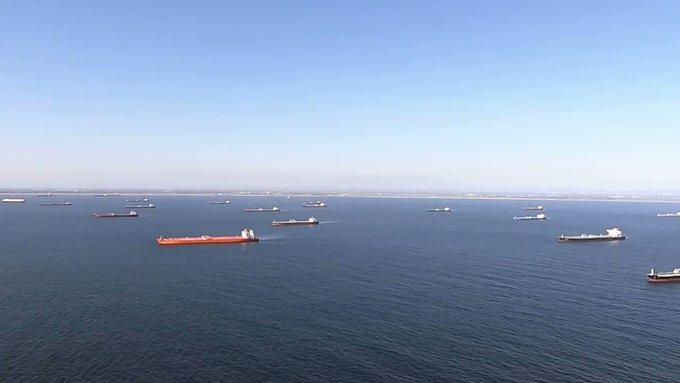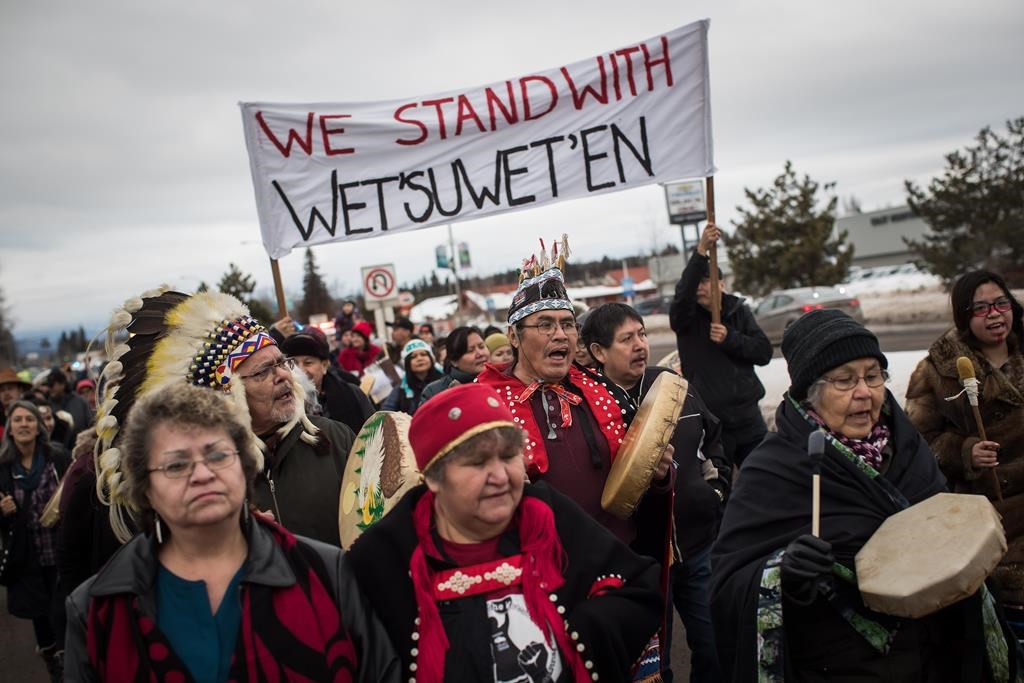De
zogenaamde ‘olie-oorlog’ tussen Saoedi-Arabië en Rusland, gevoerd
voor de prijs van olie was niet gericht tegen elkaar, maar tegen de
schaliegas en schalie-olie productie van de VS en niet in de laatste plaats daar de VS zich voor de zoveelste
keer niet wenst te houden aan afspraken gemaakt door de OPEC.
De
VS weigert simpelweg minder olie en gas te produceren, anders dan
door ‘natuurlijke oorzaak’, zoals de Coronacrisis die zorgt voor een
fiks verminderde vraag naar olie en gas….. Sterker nog: de VS noemt
deze ‘natuurlijke vermindering van productie’ een vermindering van
productie zoals bedoelt door de OPEC, terwijl de OPEC landen te maken hebben met
eenzelfde vermindering van vraag naar olie en gas, en
daarbovenop een vermindering van deze productie wensen om de prijs
weer op peil te krijgen…….
In feite
is de VS dom bezig, immers een vermindering van het aanbod aan olie en gas zou de prijs voor de schalie-olie en schaliegas-winning juist meer rendabel maken….. Deze winning van gas en olie wordt zwaar gesubsidieerd en met een verminderd aanbod zou de prijs zoals gezegd omhooggaan, waardoor subsidiëring meer lucratief is. Door het niet handelen van de VS op de vraag van de OPEC en de reactie daarop van Saoedi-Arabië en Rusland daalde de olieprijs zover dat men in de VS nog meer geld moet toeleggen op elk geproduceerd vat
olie…. Precies dat laatste was dan ook de bedoeling van vooral
Saoedi-Arabië, daar haar olie (en dat van Rusland) een stuk
goedkoper kan worden gewonnen en men wel ruimte heeft voor een ‘tijdelijke’ prijsverlaging.
Lullig voor Saoedi-Arabië maar Trump heeft
nog eens laten weten dat zonder de VS het Saoedische koningshuis nog
geen 2 weken kan standhouden, waarna de psychopathische moordenaar Mohammad bin Salman (MBS), de Saoedische kroonprins,
weer braaf luistert naar wat de meesters in de VS wensen: een fikse
reductie op de productie, zodat de winning van schalie-olie weer
lucratief wordt en dat is zo als een vat olie minstens $ 40.– oplevert (ook al wordt deze productie nog steeds
gesubsidieerd, zelfs als was het alleen door de niet aan milieuregels
gebonden productie van deze uiterst vervuilende olie- en gaswinning….)
Volgens Mike Whitney, de schrijver van het hieronder opgenomen artikel zou Putin de olieprijs op minstens $ 45.– per vat willen houden, echter daarmee zou Putin in de eigen voet schieten, immers zo wordt de zwaar gesubsidieerde schalie-olie en gaswinning in de VS weer enigszins lucratief. (en reken maar dat Rusland als Saoedi-Arabië de hele schalie-olie winning in de VS plat zou willen leggen…)
Het
volgende artikel werd zoals gezegd geschreven door Mike Whitney en door mij
overgenomen van Information Clearing House, onder het artikel
kan je klikken voor een ‘Dutch’ vertaling, dit neemt wel enige tijd
in beslag:
The
Russia-Saudi Oil-Price War Is a Fraud and a Farce
By
Mike Whitney
April 16,
2020 “Information
Clearing House”
–
The Russia-Saudi oil-price war is a fabrication concocted by the
media. There’s not a word of truth to any of it. Yes, there was a
dust up at an OPEC meeting in early March that led to production
increases and plunging prices. That part is true. But Saudi Arabia’s
oil-dumping strategy wasn’t aimed at Russia, it was aimed at US
shale oil producers. But not for the reasons you’ve read about in
the media.
The
Saudis aren’t trying to destroy the US shale oil business. That’s
another fiction. They just want US producers to play by the rules and
pitch in when prices need support. That might seem like a stretch,
but it’s true.
You
see, US oil producers are not what-you’d-call “team players”.
They don’t cooperate with foreign producers, they’re not willing
to share the costs of flagging demand, and they never lift a finger
to support prices. US oil producers are the next-door-neighbor that
parks his beat-up Plymouth on the front lawn and then surrounds it
with rusty appliances. They don’t care about anyone but themselves.
What
Putin and Saudi Crown Prince Mohammed bin Salman want is for US
producers to share the pain of oil production cuts in order to
stabilize prices.
It’s an entirely reasonable request. Here’s a clip from an
article at oilprice.com that helps to explain what’s really going
on:
“… there was a sliver
of hope that oil prices may rebound after Reuters reported that Saudi
Arabia, Russia and allied oil producers will agree to deep cuts to
their crude output at talks this week but
only if the United States and several others join in with curbs to
help prop up prices that have been hammered by the coronavirus
crisis. However, in an attempt to have its cake and eat it too, the
U.S. DOE said on Tuesday that U.S. output is already falling without
government action, in line with the White House’s insistence that
it would not intervene in the private markets….
… OPEC+ will
require the United States to make cuts in order to come to an
agreement:
The EIA report today demonstrates that there are already projected
cuts of 2 (million bpd), without any intervention from the federal
government,” the U.S. Energy Department said.
That is not enough for
OPEC+ however, and certainly not Russia,
which on Wednesday made clear that market-driven declines in oil
production shouldn’t be considered as cuts
intended to stabilize the market, Kremlin spokesman Dmitry Peskov
tells reporters on conference call.
“These are completely
different cuts. You are comparing the overall demand drop with cuts
to stabilize global markets. It’s like comparing length and width,”
Peskov said…..Moscow’s participation is highly contingent on the
US, and is unlikely to agree to output cuts if the US does not join
the effort.” (“Historic Oil Deal On The Verge Of Collapse As
Russia Balks At U.S. ‘Cuts’”, oilprice.com)
Putin
is being reasonable and fair. If everyone else is forced to cut
supply, then US oil producers should have to cut supply too. But they
don’t want to share the pain, so they’ve settled on a strategy
for weaseling out of it. They want their reductions in output (from
weak demand during the pandemic) to count as “production cuts”.
They even have a name for this swindle, they call it “organic
production cuts”, which means no cuts at all. This is the way
hucksters do business not responsible adults.
What
does Putin want from this deal?
Price
stability. Yes, he’d like to see prices settle somewhere north of
$45 per barrel but that’s not going to happen for a while. The
combination of a weaker demand (due to the coronavirus) and
oversupply (from the Saudis flooding the market) have ensured that
prices will remain low for the foreseeable future. Even so, Putin
understood what the Saudis were doing by flooding the market, and he
knew it wasn’t directed at Russia. The
Saudis were trying to persuade US oil producers to stop freeloading
and cut production like everyone else.
That’s the long and short of it. Check out this excerpt from an
article by oil expert, Simon Watkins at oilprice.com:
“Saudi Arabia
was continually peeved …(because)
its efforts to keep oil prices up through various OPEC and OPEC+
agreements were allowing these very shale producers to make a lot
more money than the Saudis, relatively speaking. The reason for this
was that U.S.
shale producers…. were not bound in to the OPEC/OPEC+ production
quotas so could fill the output gaps created by OPEC producers.”
(“The Sad Truth About The OPEC+ Production Cut”, Simon Watkins,
oilprice.com)
This
is what the media fails to tell their readers, that US oil producers–
who don’t participate in any collective effort to stabilize prices–
have been exploiting OPEC production quotas in order to fatten the
bottom line at the expense of others. US
producers figured out how to game the system and make a bundle in the
process.
Is it any wonder why the Saudis were pissed?? Here’s more from the
same article:
“This allowed the U.S.
a rolling 3-4 million bpd advantage over Saudi in the oil exports
game, meaning that it quickly became the world’s number one oil
producer…. Hence, Saudi Arabia decided initially to unilaterally
announce its intention for the last OPEC+ deal to be much bigger than
that which it had pre-agreed with Russia, hoping to ambush the
Russians into agreeing. Russia, however, turned around and told Saudi
Arabia to figuratively go and reproduce with itself. MbS,… then
decided to launch an all-out price war.” (oilprice.com)
So
you can see that this really had nothing to do with Russian at all.
The Crown Prince was simply frustrated at the way US oil producers
were gaming the system, which is why he felt like he had to respond
by flooding the market.
The obvious target was the US shale oil industry that was taking
advantage of the quotas, refusing to cooperate with fellow oil
producers and generally freeloading off the existing quota system.
And
what’s funny, is that as soon as the Saudis started putting the
screws to the US fracking gang, they all scampered off to Washington
en masse to beg for help from Papa Trump. Which is why Trump decided
to make emergency calls to Moscow and Riyadh to see if he could hash
out a deal.
It’s
worth noting that domestic oil producers have been involved in other
dodgy activities in the past. Check out this excerpt from an article
in the Guardian in 2014, the last time oil prices crashed:
“After standing at well
over $110 a barrel in the summer, the cost of crude has collapsed.
Prices are down by a quarter in the past three months….
Think about how the Obama
administration sees the state of the world. It wants Tehran to come
to heel over its nuclear programme. It wants Vladimir Putin to back
off in eastern Ukraine. But after recent experiences in Iraq and
Afghanistan, the White House has no desire to put American boots on
the ground. Instead,
with the help of its Saudi ally, Washington is trying to drive down
the oil price by flooding an already weak market with crude. As the
Russians and the Iranians are heavily dependent on oil exports, the
assumption is that they will become easier to deal with…
The Saudis did something
similar in the mid-1980s. Then, the geopolitical motivation for a
move that sent the oil price to below $10 a barrel was to destabilize
Saddam Hussein’s regime….
Washington’s
willingness to play the oil card stems from the belief that domestic
supplies of energy from fracking make it possible for the US to
become the world’s biggest oil producer.
In a speech last year, Tom Donilon, then Barack Obama’s national
security adviser, said the US was now less vulnerable to global oil
shocks. The cushion provided by shale oil and gas “affords us a
stronger hand in pursuing and implementing our national security
goals”. (“Stakes are high as US plays the oil card against Iran
and Russia”, The Guardian)
This
excerpt shows that Washington is more than willing to use the “oil
card” if it helps to achieve its geopolitical objectives. Not
surprisingly, good buddy, Saudi Arabia, has historically played a key
role in helping to promote those goals. The current incident,
however, is the exact opposite. The Saudis aren’t helping the US
achieve its objectives, quite the contrary, they’re lashing out in
frustration. They feel like they’re being squeezed by Washington
(and US producers) and they want to prove that they have the means to
fight back. Flooding the market was just MBS’s way of “letting
off steam”.
Trump
understands this, but he also understands who ultimately calls the
shots, which is why he took the unusual step of explicitly warning
the Saudis that they’d better shape up and step in line or there’d
be hell to pay. Here’s a little background that will help to
connect the dots:
“..the deal made in
1945 between the U.S. President Franklin D. Roosevelt and the Saudi
King at the time, Abdulaziz, that has defined the relationship
between the two countries ever since… the
deal that was struck
between the two men on board the U.S. Navy cruiser Quincy… was that
the U.S. would receive all of the oil supplies it needed for as long
as Saudi Arabia had oil in place, in return for which the U.S. would
guarantee the security of the ruling House of Saud.The
deal has altered slightly ever since the rise of the U.S. shale oil
industry
and Saudi Arabia’s attempt to destroy it from 2014 to 2016, in that
the U.S. still guarantees the security of the House of Saud but it
also expects Saudi Arabia not only to supply the U.S. with whatever
oil it needs for as long as it can but also – and this is key to
everything that has followed – it also allows the U.S. shale
industry to continue to function and to grow.
As far as the U.S. is
concerned, if t his
means that the Saudis lose out to U.S. shale producers by keeping oil
prices up but losing out on export opportunities to these U.S. firms
then tough..
As U.S. President Donald
Trump has made clear whenever he has sensed a lack of understanding
on the part of Saudi Arabia for the huge benefit that the U.S. is
doing the ruling family: “He
[Saudi King Salman] would not last in power for two weeks without the
backing of the U.S. military.”
(“The Sad Truth About The OPEC+ Production Cut”, Simon Watkins,
Oil Price)
Trump
felt like he had to remind the Saudis how the system actually works:
Washington gives the orders and the Saudi’s obey. Simple, right? In
fact, the Crown Prince has already slashed oil production
dramatically and is fully complying with Trump’s directives,
because he knows if he doesn’t, he’s going to wind up like Saddam
Hussein or Muammar Gaddafi.
Meanwhile,
US shale oil producers won’t be required to make any cuts at all
or, as the New York Times puts it: “It was not immediately clear if
the Trump administration made a formal commitment to cut production
in the United States.”
Got
that? So everyone else cuts production, everyone else sees their
revenues shrink, and everyone else pitches-in to put a floor under
prices. Everyone except the “exceptional” American oil producers
from the exceptional United States. They don’t have to do a damn
thing.
Mike
lives in Washington state. He can be reached
at fergiewhitney@msn.com.
– “Source“
Click
for
Spanish,
German,
Dutch,
Danish,
French,
translation- Note- Translation
may take a moment to load.









